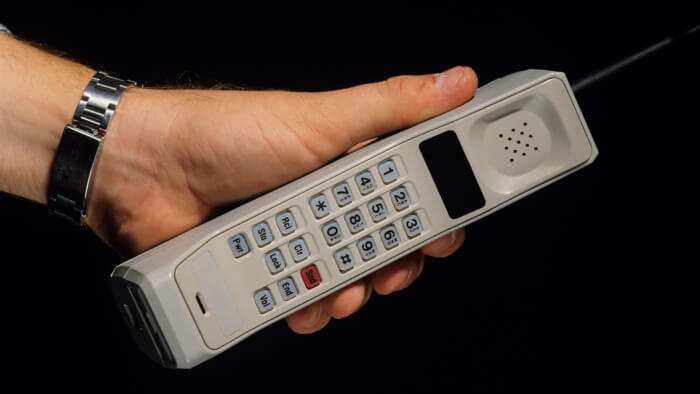The mobile revolution has only just begun, says Prophet's Paul English. In fact, tech advances across the industry in the next few years are going to knock your socks off.
In retrospect, it seems like a long time since 1985’s historic first-ever mobile phone call on a UK commercial mobile network. By the end of that year, nascent Vodafone had sold around 12,000 mobile phones at today’s equivalent of £5,000 each.
Today, you’d be hard-pressed to find a nation outside of Cuba or North Korea that doesn’t have at least 70% mobile penetration, with many markets boasting well over 100%. With a smartphones sales outnumbering feature phones in many markets, the world is increasingly being equipped with highly-connected, app-laden handheld personal computers at a wide variety of types and price points.
One chipmaker (ARM) has already set a date –2016 –for when smartphones will be able to handle all the tasks we currently need a computer to do. While this may be the slightly oversimplified view of a chipmaker with a specific bias, it speaks to the current state of mobile technology, its capabilities and its prevelance. Already there are large parts of the world where the smartphone is the first, primary and only networked computing device.
"It’s likely that everything in business will be mobile-optimised eventually - it's inevitable and irreversible"
If you’re in business, by now you’ve come to understand that failure to pay attention to “the age of mobile” could mean your company’s relegation to the fate of Kodak. You’ve understood that websites need to be responsive, that services need to be “appified” and that your customers will begin deserting you if you can’t serve them what they want when and where they want it.
While the Ubers and the Airbnb’s of the world grab the headlines, mobile technologies are steadily transforming a broad range of industries.
Retail
Obviously there’s the question of convenience and economic efficiency that mobile users experience. More and more of the activities and services they engage with daily are available on mobile devices, and that’s helping make quicker and better-informed choices about what where they go and what they buy. In-store location aware apps promise to deliver more customised, relevant experiences at the point of sale.
Health and fitness
Not only have we seen consumer-focused mobile health and fitness products like FitBit and Nike+, but mobile is improving health resources and services in profound ways. Applications for remote diagnosis put first-rate resources at the disposal of remote areas of the developing world.
Companies like Sproxil offer Mobile Product Authentication to help prevent the estimated 100,000 deaths that result annually from people taking counterfeit drugs. Drug packages are supplied with scratch-off codes that users can SMS or enter into apps to verify that they’ve got the real thing.
PLM, a leading publisher of medical references in Latin America, created a suite of reference apps that after 6 months were used by 140,000 doctors, who now frequently updated compendia of information at their fingertips, in the office or in the field.
The GoodSam app brings the social ethos to first aid. When the app is open and activated, nearby first aiders who have also registered are be contacted and sent to help. Will this app disrupt municipal emergency services? Probably not, but ideas like this can complement them in meaningful ways.
Financial services
Mobile payment technologies like ApplePay and Google Wallet have not yet hit it big with consumers in the the UK, continental Europe or the US, but “with 261 mobile money services across 89 countries worldwide, mobile money already covers nearly two-thirds of the developing world,” reports TechCrunch.
“Remarkably, in 16 of these countries, there are more mobile money accounts than bank accounts.” Meanwhile, few UK banks don’t offer robust mobile apps that give customers to their services on demand.
Security
A lot has been said about how growth in mobile presents increased security threat, but mobile innovation is improving people’s lives, from pet chipping to smart app-controlled home fire and security systems. The new “Panic Button” Uber deployed in its app in India lets someone call for help from their mobile with the touch of a button if they feel they’re in danger in their ride.
Logistics / Supply Chain
Freight services are notorious for their antiquated systems and processes, and the opacity of the service to customers. Qantas Freight Enterprises, the air freight unit of Qantas Group, initiated abroad-reaching tech and process upgrade that included electronic air waybilling and a mobile site and smartphone apps to enhance the online customer experience.
Now customers use apps to access real-time information on flight schedules, potential delays and shipment locations, and the mobile site allows consignees to see exactly where their shipments are, anywhere in the world.
Staff use iPads across terminal operations speed up processing and moving shipments through the terminal. The reduced processing time for customer freight pickup has increased staff productivity and customer satisfaction.
The list goes on of mobile plays that are disrupting traditional industries with better convenience, price and selection. Yet, considering that it was only in 2013 that global smartphone shipments overtook feature phones, and tablet shipments surpassed PCs, we’re really at the start of this journey. Today a perfect storm is gathering that will shape mobile development in the years to come:
- Continued growth of mobile processing power and connectivity speeds.
- The rapid evolution of mobile capabilities into wearables, vehicles, drones, retail environments, and pretty much every point on the supply chain.
- The coming proliferation of sensors embedded into mobile devices that will help devices collect thousands of data points a second and make decisions based on them.
Innovation and transformation begin to become more than good business sense, they become a question of survival as disruptive technology and business models increasingly threatens the status quo.
It’s about the consumer
If there’s a singule force behind changes companies will have to make, it’s not increased internal efficiency; it’s increased demand by customers – B2B and B2C – that product and services become more mobile. New technology brings new user expectations. Meeting those expectations should be a question of business survival.
Failure to put the customer first is a risky bet, and some recent notable mobile technologies launches that have come to market in what seem to have been solutions in search of problems.
Apple’s iBeacons were launched over a year ago with much fanfare as the Holy Grail for mobile-enabled retail experiences. But all the initial efforts focused on trying to fit an old promotional model on a new technology. Because the tech hasn’t been used to enhance customer experiences in a way that delivers new value, retailers have been very slow to pick them up.
Remember when 3G was first launched? According to mobile carriers, the killer app would be mobile video conferencing. While that was quite a mistaken notion at the time, consumers quickly found other ways to use the speed and connectivity, and once Apple came out with a device that made this easy for users and developers, things really took off.
Key considerations for businesses
While keeping an eye on changing consumer habits and expectations is key, also be on the lookout for new technologies and startups that are disrupting parts of your business. The brewing war of mobile payment systems is perhaps the most visible example of Financial Services disruption.
Other mobile products and services are undercutting incumbents in many instances, while also frequently offering very compelling social and ethical components. Companies need to be aware of disruptive technologies and be adept at understanding how to pre-empt or co-opt them.
It’s likely that everything in business will be mobile-optimised eventually. This trend is just as inevitable as it is irreversible.
Not only will mobile continue to play an increasingly pivotal part of the consumer experience but improvements in enterprise resource management, logistics, and the fluidity of process that mobile brings will only increase as the world becomes increasingly connected on the move.
On the not-too-distant horizon, new technologies that will fuel mobile’s next stages of growth include proliferation of mobile payment options; mobile control of the Internet of Things; and augmented reality.
- The Internet of Things, widely quoted by Cisco as being $19 trillion industry by the mid 2020’s, will be controlled by mobile devices.
- Augmented reality which has until now been mostly associated with gimmickry and the aborted Google Glass initiative, is starting to show real promise as processing power is being matched to practical real-world uses, as Mini has recently demonstrated.
As we move toward the brave new mobile world, It’s important to note that the definition of mobile has changed as the technology has evolved, and will continue to do so. I remember the first ads for mobile enterprise solutions, which basically involved a photo of a guy on a beach with a laptop and a ”Your new office” caption.
As technology, devices and sensibilities evolve, companies need look beyond the smartphone and first generation wearables if they wish to seize opportunities, many of which are not yet obvious.
Thanks for signing up to Minutehack alerts.
Brilliant editorials heading your way soon.
Okay, Thanks!



